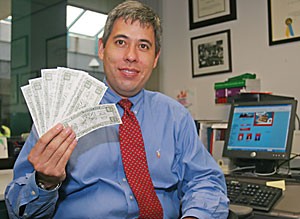A UA law professor will be featured this week on Comedy Central’s “”The Daily Show”” with Jon Stewart to discuss the drawbacks of a $1 million lottery.
Jack Chin, a UA law professor, will be on a “”Daily Show”” segment about Arizona’s Proposition 200, which would award two Arizonans $1 million for voting in the primary and general elections.
Chin said the Arizona Voter Rewards Initiative could take away the idea that voting is a civic duty and the pride that comes with wearing an “”I voted”” sticker.
It would be like army recruiters talking about financial benefits instead of the pride of serving the country, Chin said.
“”We would have a government that is more reflective of the will of the people if we increased turnout,”” Chin said. “”But (Proposition 200) is a bridge too far.””
The Arizona Voter Rewards Initiative developed from an idea that Dr. Mark Osterloh, a Tucson physician and unsuccessful 2002 gubernatorial candidate, had while riding his bike around during his campaign for governor.
In 2003, after Osterloh filed the paperwork to enter the proposition on the voting ballot, Northern Arizona University’s Social Research Laboratory conducted a statewide poll on the then-potential initiative.
According to the results, 77 percent of registered voters said an election lottery would make no difference as to whether they do or do note vote in an election.
Osterloh laughed at the notion that there would be no change. He said Proposition 200 is a real-world solution for a real-world problem.
But offering a reward is not the only real-world solution to get people to the polls, Chin said.
Vote by mail and early voting have allowed people to fit voting into their individual schedules. Saturday elections or declaring Election Day a state holiday are two options that Chin believes could increase voter numbers.
However, Osterloh said the Voter Rewards Initiative would be cost-effective because the initiative could free up millions of dollars that are put into state voting campaigns. The lottery money would be funded from unclaimed prizes from the Arizona Lottery.
Still, Chin disputes the notion that money is an efficient motivator. People interested in easy money would be more likely to buy a $1 lottery ticket than spend the time investigating issues and driving to the polls, Chin said.
Australia has a voter turnout rate of 95 percent and fines citizens $20 if they do not vote. Because of this, many ballots are returned blank or with a random selection, Chin said.
Osterloh said he does not believe that blank ballots would be a large problem because people will want to make conscious decisions about issues that affect them.
Proposition 200 could qualify as a violation of a federal statute that prevents payment to people for voting, but Osterloh said his plan does not infringe on the Voters Rights Act because it does not influence how people vote.
There is no legitimate purpose for the government to reject a law like this, Osterloh said.
But it will not be likely that the people who already vote will support the initiative, Chin said.
“”I think two-to-one it will fail,”” Chin said. “”On the other hand, if it passes, I’ll take the money.””
The initiative has received national and international attention. Both Chin and Osterloh have been interviewed by reporters from The New York Times and the BBC.
As a professor of a public law school, Chin said he thought it was important to share his expertise with society at large. But he still plans on having his family watch the interview before he does.
“”If I look like a square, stiff law professor, that’s just the camera and editing,”” Chin said. “”I’m really a hipster.””









